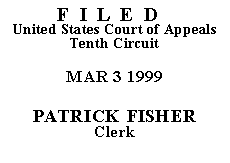 UNITED STATES COURT OF APPEALS
UNITED STATES COURT OF APPEALS
 UNITED STATES COURT OF APPEALS
UNITED STATES COURT OF APPEALS
TENTH CIRCUIT
| JEWEL WAGGONER, and as Natural Parent and Next Friend of BRAIDON LEE WAGGONER and TALON LAUREN WAGGONER; CRAIG WARD; and PATRICIA WARD, | |
| and | |
| FRANKLIN HANK DIPPERY;
MESCAL DIPPERY; JOHN FRIEND;
MARY R. FRIEND; LORA MAE
CLARK; LINDA TRUETT COMPTON;
and CASSIDY JO COMPTON,
and JOHN T. AUNKST, JR.; PAULA F. AUNKST; VELMA I. MCEWEN; and PAUL C. BANDY, Plaintiffs, |
No. 97-2131
No. 97-2132 No. 97-2145 (D.C. No. 93-CV-1091) (D.N.M.) |
| v. | |
| AMOCO PRODUCTION COMPANY,
and BURLINGTON RESOURCES OIL & GAS COMPANY,
Defendant.
|
ORDER AND JUDGMENT(*)
Before SEYMOUR, Chief Judge, TACHA, and BALDOCK, Circuit Judges.
Plaintiffs are landowners in San Juan County, New Mexico who claim that gas escaping from wells located near their property contaminated their water supplies and caused them personal injury. Believing that Defendant Amoco Production Company owned and operated the wells, Plaintiffs filed the instant diversity action in the district court.(1) As grounds for relief, Plaintiffs advanced numerous state law theories including: (1) negligence; (2) trespass; (3) nuisance; (4) inherently dangerous activity; (5) abnormally dangerous activity; (6) negligent misrepresentation; and (7) fraud.
At trial, Plaintiffs proposed to call several expert witnesses in support of their claims. After holding a hearing pursuant to Daubert v. Merrell Dow Pharmaceuticals, Inc., 509 U.S. 579 (1993), the district court determined that the experts' proposed testimony was not based on scientifically valid principles.(2) Accordingly, the district court excluded the witnesses from testifying at trial. Shortly thereafter, the presiding judge recused himself and the clerk of the court assigned the case to another judge.
Plaintiffs filed a motion before the new judge, requesting that he reconsider the previous judge's ruling excluding their experts. The judge, determining that a new appellate case controlled the determination, reversed the earlier judge's ruling and allowed the experts to testify at trial. The jury returned a verdict for Plaintiffs against Amoco, but reached a defense verdict in regard to the claims against Burlington. Amoco filed a motion for judgment as a matter of law, in which it contended that Plaintiffs' claims were barred under New Mexico's three-year statute of limitations for personal injuries.
The district court agreed that Plaintiffs Jewel Waggoner, Braidon Lee Waggoner, Talon Lauren Waggoner, Craig Ward, Patricia Ward (Waggoner and Ward Plaintiffs) and Cassidy Compton's claims were time barred under the statute. Accordingly, the court ordered that those Plaintiffs take nothing and ordered them to pay costs to Amoco and Burlington. The court denied the motion for judgment as a matter of law as it related to the remaining Plaintiffs. Thus, the court entered judgment for the prevailing Plaintiffs against Amoco and awarded costs in their favor. The court further ordered that the prevailing Plaintiffs take nothing against Burlington and awarded costs to Burlington.
The Waggoner and Ward Plaintiffs appeal the district court's decision. On appeal, they argue that the district court erroneously applied New Mexico's three-year personal injury statute of limitation instead of the four-year statute of limitation for damage to property. In addition, Plaintiff's argue that even if the three-year statute applies, that the district court should have tolled the running of the statute or applied the relation back doctrine.
Amoco cross-appeals, arguing that the district court erred in not finding all of the claims, excluding those pertaining to Plaintiffs Franklin and Mescal Dippery, barred by the statute of limitations. Amoco further argues that the second district court judge was bound under the law of the case doctrine to follow the earlier judge's rulings regarding Plaintiffs' experts. Without expert testimony, Amoco argues, Plaintiffs cannot prove causation. Accordingly, Amoco asks that we enter judgment in its favor against all Plaintiffs.
Our jurisdiction arises under 28 U.S.C. § 1291. We have carefully reviewed the parties' briefs, the district court's orders and the entire record before us. Based upon our review of the record and the applicable law, we conclude the district court did not commit reversible error.
Accordingly, the district court's judgment is AFFIRMED. Defendant's unopposed motion to file an addendum to its supplemental appendix under seal is GRANTED.
Entered for the Court,
Per Curiam
*. This order and judgment is not binding precedent, except under the doctrines of law of the case, res judicata, and collateral estoppel. The court generally disfavors the citation of orders and judgments; nevertheless, an order and judgment may be cited under the terms and conditions of 10th Cir. R. 36.3.
1. Plaintiffs and a number of other landowners initially attempted to pursue their claims as a class action. The district court refused to certify the class, but consolidated the instant cases for trial.
2. One of Plaintiffs' experts offered an alternative theory under which he theorized that Defendant was responsible for causing Plaintiffs' injuries. The district court reserved ruling on the alternative theory.